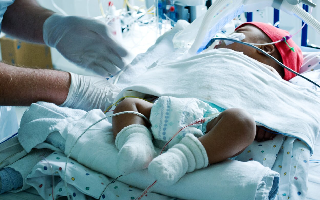
- No win. No fee.
- No hidden costs
- 100% risk-free, only pay if you win
- Home >
- Insights >
- Medical Negligence >
- Medical negligence claims: Compensation for loss of income
About the Author
Tami Frankel
Medical Negligence Solicitor and Partner - LLB (Hons) University College London
Read more about Tami »Following a medical mistake, it is normal to have a lot of questions and uncertainty – especially about your financial situation.
If you or a loved one is unable to work, either temporarily or permanently, due to a healthcare professional’s negligence, it is understandable to worry about how you will pay the bills, or keep up with mortgage payments.
This is why in medical negligence cases, loss of income, including loss of earnings, is included when determining compensation.
While it cannot take someone back in time to prevent an injury, compensation helps a claimant return to the position they were in before their injuries. Or, when this is not possible, it provides them with financial support to manage their life moving forward, so it can be as comfortable and fulfilling as possible.
Below we will outline how you can claim for loss of income, and what you must prove for this claim to be successful.
Compensation for loss of income
Defining loss of income
Loss of income is essentially as it sounds – any reduction in income, either earned or otherwise, that the claimant suffers, or will suffer, as a direct result of the negligence of a medical professional.
Loss of earnings
If the injury suffered due to negligence means that the claimant is unable to work and they lose income as a result, then that loss can be claimed from the defendant. The loss of earnings may be temporary or permanent. It also includes situations where the injured person has to reduce their hours at work or change career.
If the claimant is lucky enough to have an employer who is understanding, but may find it difficult to find a new position if they need to change job in the future, then they may be able to claim a payment to reflect that they will be at a disadvantage on the labour market.
If a change of career is necessary and the claimant has to leave a job which they love, then a single award for loss of congenial employment may also be claimed.
Medical claims compensation is comprised of two parts – general damages and special damages. Loss of income falls into the latter category, as it relates to the specific financial impact that the claimant experiences due to the negligence.
For more information, please read our helpful guide to medical negligence compensation.
Can I claim for loss of income in a medical negligence claim?
Anyone can claim for loss of income if, as a result of medical negligence:
They have had to take a period of absence from work
They are no longer able to work
They have had to leave their current employment
They have had to take a new job at a reduced salary
Their ability to earn overtime, commissions, bonuses, etc., has been reduced
They have had to leave a career they love
Furthermore, it may be possible for someone to claim for loss of income if they have to take a period of time off work to look after a loved one who has suffered a medical mistake, or to fulfil that person’s household responsibilities while they are incapable of doing so.
For example, if a stay-at-home parent is left disabled for several months, a partner or parent may consider it necessary to take time off work to perform chores or tasks on their loved one’s behalf. The claimant will be able to claim for either the loss of salary suffered by the person providing the help and care, or an hourly rate for the care they provided.
It is important to note that any time taken off from work as holiday (and therefore paid by an employer) cannot be included in a compensation claim.
Loss of congenial employment
It may be that a claimant is forced to leave their job as a result of their injuries, but is able to find another role that offers the same salary. However, they loved their previous job, while their new role is far less satisfying.
In these circumstances, the claimant may be able to claim for loss of congenial employment. This is a one-off payment to recognise the loss suffered by someone who is now unable to follow their chosen career as a result of a medical mistake.
Disadvantage on the Open Labour Market
If an injury sustained as a result of medical negligence leaves someone disabled in a way that means that they may find it more difficult to find a new job in the future, then it is possible they can claim for Disadvantage on the Open Labour Market.
For example, if a nurse or painter-decorator loses sensation in their right hand which affects their ability to work and their current employer is able to make allowance for that difficulty, they may still find it more difficult to find new employment than they would have without the disability. They are reliant on the flexibility and goodwill of that employer with whom they already have a relationship.
However, this flexibility and goodwill will not be present when applying for new positions, putting them at a disadvantage and likely meaning that they will remain unemployed for periods of time. This is compensated for with this award.
How is loss of income calculated?
There is currently no maximum or minimum threshold for the amount which may be claimed for loss of income in any injury claim. However, it has been proposed in recent years that the amount which may be claimed for loss of earnings in medical negligence cases only should be capped.
This is a proposal that Gadsby Wicks is fighting, as we believe there is no reason to treat those injured by a medical mistake differently to those injured in any other way, such as a road traffic accident or accident at work.
To calculate loss of income, it is first important to consider whether the loss of income is temporary or ongoing.
Temporary loss of income
For example, a builder suffers a mistake during surgery, meaning they require an additional operation and a further six months of recovery. During this time, they are unable to perform their job. If after those six months they are able to return to work, this means the extent of their loss of income will be limited to those additional six months.
This is because even if the surgery had been successful, the builder would have still required a period of recovery time. So, if they expected to take a month off work to recover from the surgery, this would not be included when calculating their loss of income.
Ongoing loss of income
It can be more complex when the injury a claimant receives affects their future loss of earnings. For instance, a claimant suffers a mild head injury following a medical mistake that alters their personality or mental capacity. This could mean that they will no longer be able to perform their current role, or cannot be given the same level of responsibility by their employer.
If the claimant loses their job, and is not suitable for other forms of employment, then it is possible for them to claim for the earnings they would have otherwise received for the remainder of their career.
If the claimant can find another job, but with a lower salary than their previous role, they may also be able to claim for loss of income between what they would have earned and what they will now earn. They may also be entitled to loss of congenial employment if they have been forced to leave a career that they love.
There are other ways in which a claimant may suffer a loss of earnings, such as:
- If they now suffer from long-term fatigue, say following peritonitis, and so can now only work three days a week instead of five
- If they are now unable to work overtime, earn as much commission or continue with a second job or side hustle
- If they were working part-time, with the intention of moving to a full-time role at a point in the future, such as when children reach a certain age, but can no longer do so
Career progression
If the claimant is in the early phases of their career when a medical mistake occurs, it is likely that they are not at the peak of their earning potential.
In these circumstances, it is not simply a case of calculating their loss of income based on their existing salary. We also take into account their likely career progression and consider how their career is likely to have progressed step by step and the increase in salary which would have occurred at each of those steps.
Nature of injury
It is also important to consider the nature of the injury a claimant suffers and how that relates to their specific job role. For instance, a loss of sensation in a person’s thumb may seem like a trivial injury to most. However, consider how that would affect the careers of:
- Machinists
- Pianists
- Gardeners
- Carpenters
- Hairdressers
- Surgeons
A severe thumb injury may prevent someone from continuing in a specific role and force them to change career. If this change means that they have to accept a lower salary now or at some point in the future, then they can claim for loss of income. This is why the value of a claim for loss of income can be radically different between two claimants, even when those claimants have suffered the exact same injury.
Pensions
The immediate loss of income associated with an inability to work, be it temporary or permanent, can have a knock-on effect on a claimant‘s pension.
Whether a claimant was paying into a private pension, their employer was contributing towards a pension, or a mix of both, if the claimant is left unable to earn money following a medical mistake, this may reduce the amount that they are able to pay into their pension pot.
Therefore, as part of calculating total loss of income, we will also assess the likely reduction in a claimant’s pension.
What if I am unemployed?
If a claimant is unemployed, we will work closely with them to discuss their circumstances and whether there was likely to be a change in the future. This will include considering their previous employment and whether they were pursuing any roles prior to their injury.
If a claimant is already deemed incapable of work and is receiving disability benefits, this could mean that there is no loss of income, but not always.
What if the claimant is a child?
If a child suffers a birth injury that will affect their long-term employment prospects, such as Cerebral Palsy, we consider the educational and vocational achievements of their parents and siblings. While it is impossible to accurately predict someone’s future, this gives us an educated estimate of what their future achievements are likely to have been.
Once we have determined a suitable level of educational achievement, we will look at the average earnings for someone working at that level. This will be used to quantify their claim for loss of earnings.
For children who suffer a medical mistake while at primary school or secondary school, as well as considering the level of achievement of their family, we may get a report from an educational psychologist. This can provide further insight into the likely career path of that claimant. It will also confirm what they may now be able to achieve in the future.
How do I prove loss of income?
Now we have outlined what factors are taken into account when calculating a claim for loss of income, how does a claimant prove the actual amount lost?
Like everything in a medical negligence claim, the burden of proof is on the claimant. The claimant must prove that the defendant caused their injuries, and that they are entitled to compensation. This is judged on the Balance of Probabilities – it must be proven that an event was more likely than not to have occurred.
The defendant does not have to do anything until the claimant is able to provide suitable evidence to a Judge for their claim. Claiming for loss of income is no different, and this means we work very closely with our clients to determine and obtain the best evidence.
In many cases it is the claimant who is in the best position to give evidence as to their own likely career path; earnings; future plans and the effect of the injuries on their income. The detail required will vary with each case. The information required for a two-week loss of earnings claim is very much less than that needed where the claimant cannot work again or their earning capacity is permanently impaired.
In order to best support a claim for loss of income, a statement should contain:
The claimant’s educational history and qualifications
The claimant’s employment history
The claimant’s earnings to the date of the injury
The claimant’s earnings since the date of the injury
The claimant’s career plans, both before the injury and now
Details of earnings that the claimant has lost, taking into account any incremental increases and promotions
Details of any new employment that the claimant has undertaken since the incident
Details of the claimant’s attempts to retrain or find work
An explanation of how the claimant’s injuries affected their previous role, and how it has affected their attempts to find new work
An explanation of how vulnerable the claimant’s job has now become
An explanation of how the claimant’s injuries have affected their ability to work longer hours, overtime, shift work and obtain bonuses
When the claimant had planned to retire and when they are now likely to retire
Details of whether the claimant’s injuries have affected their chances of promotion
An explanation of whether the injuries have affected the claimant’s satisfaction at work
This can be additionally complex if the claimant is self-employed. This is because their annual income may fluctuate significantly from year-to-year, even if turnover is the same or increasing, and this needs to be explored and explained. Or they may have been on the verge of a contract or project that would have increased turnover income substantially.
We will often also obtain statements from clients of the business, colleagues, former colleagues, employers and former employers to substantiate the claim which is set out by the claimant.
At Gadsby Wicks, we work closely with our clients to provide the best possible legal advice, and to ensure that the evidence that is obtained when claiming for loss of income is as comprehensive as possible.
How long does it take to receive compensation for loss of income?
It could take several months or years for final settlement to be reached in a medical negligence claim. This is often problematic for claimants who still have bills, mortgages and other expenses to pay while their claim progresses.
It may be possible to apply for interim payments to fill this void. If the defendant has admitted liability, is found liable for causing the injury, or the Court considers it very likely that the defendant will be found liable, then a claimant can apply for an interim payment. The amount of any interim payment will be taken out of the total compensation that the claimant is finally awarded.
If an interim payment is not an option, a claimant may be able to apply for benefits from the Department of Work & Pensions (DWP). Following a successful claim, to avoid double recovery, the defendant may then have to pay some of the compensation awarded to the claimant to the DWP through the Compensation Recovery Unit (CRU).
Making a claim for loss of income
The consequences of medical negligence can be life-changing for anyone and can affect their ability to financially support themselves and their loved ones. We hope that this has helped you understand the process involved in formulating a claim for loss of income, and how such a claim can account for a significant proportion of the compensation received following a successful claim.
At Gadsby Wicks, our specialist solicitors are committed to ensuring our clients receive the compensation, answers and justice they deserve following a medical mistake. We work tirelessly to investigate and gather evidence to support your claim, working closely with you to secure a successful outcome.
Get in touch today to discuss your circumstances.





 Back to top
Back to top

